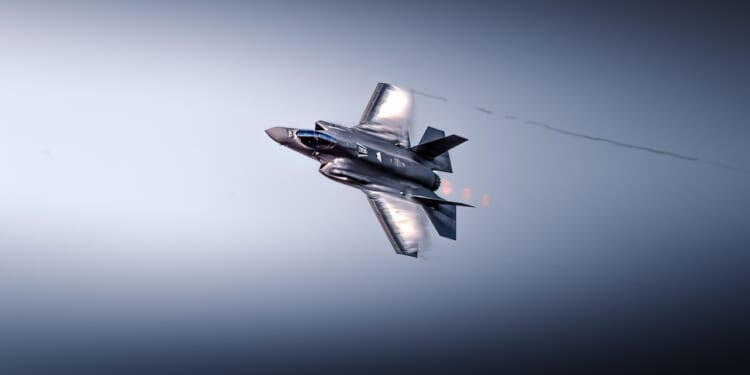In the Middle East—a region in which Turkey fancies itself the dominant power—its purchase of the F-35 will give it a freer hand to intervene in regional conflicts.
A seismic shift in the military balance of power might be underway, as the United States considers selling F-35 Lightning II fifth-generation stealth warplanes to NATO ally Turkey. The deal is in the early stages, but is being discussed at the highest levels in both governments.
Back in 2019, the Trump administration booted Turkey from the F-35 program in retaliation for Ankara’s purchase of Russian S-400 air defense systems, which raised US concerns about technology security and compatibility. Yet recent developments show that Turkey is preparing to rejoin the program—potentially as part of a larger arms package that could include F-16 upgrades or even jet engines for its domestic KAAN fighter program, amid talks of local production offsets worth over $10 billion.
The US-Turkey F-35 Deal Might Not Succeed
Opposition in the US Congress and from allies—notably Israel—persists, risking the deal.
Indeed, the Israelis are the ones who are the most concerned about Turkey potentially acquiring the F-35, as Jerusalem believes it would place Ankara, which is increasingly belligerent in its rhetoric toward Israel, at military parity with Israel.
The F-35 is a fifth-generation multirole fighter with advanced stealth, sensor fusion, and network-centric warfare capabilities, far surpassing Turkey’s current fleet of aging F-16s.
Acquiring even a single batch of around 40 jets would modernize the Turkish Air Force, enabling superior intelligence, surveillance, reconnaissance (ISR), and precision strikes. This could strengthen Turkey’s position in regional conflicts—notably against Kurdish groups in northern Syria and Iraq, or potentially against Greece in the Aegean Sea, as well as Israel, in the Eastern Mediterranean over natural gas resources.
Speaking of the simmering Greco-Turkish rivalry, the acquisition of F-35s could intensify disputes with Greece over Cyprus as well as those natural gas deposits in the Aegean. What’s more, Greek-American lawmakers in the Congress as well as their attendant lobbies strongly oppose the sale of F-35s to Turkey, warning that doing so would undermine the tenuous Greco-Turkish balance of power. Indeed, it could very well undermine the unity of NATO in Southern Europe, prompting Greece to take a more aggressive stance against their nominal NATO ally.
It’s important to note that while most experts rave about the way the plane will enhance Turkey’s airpower—on a basic level, given that Ankara’s current fleet of F-16s is deteriorating at a rapid rate—America’s F-35s have consistently failed to live up to their promise. Of course, they can help Turkey. But Turkish leaders would likely be far better off focusing on their indigenous fifth-generation warplane, the TAI KAAN. The F-35 has struggled with readiness issues since the beginning, and their cost is ghastly, especially for a frugal rising power, like Turkey. What’s more, their complexity in many cases negates their strategic value.
Nevertheless, many experts are swooning over this possible deal, and Turkey’s regional rival powers are panicking, meaning that the prospect of Turkish F-35s warrants some examination.
Are Israeli Concerns About the Turkish F-35 Warranted?
In the broader Middle East—a region in which Ankara fancies itself the dominant power—Turkey’s enhanced capabilities courtesy of the F-35 will give it a freer hand to intervene in regional conflicts. Turkey has already clashed with Israel over access to, and control over, Syria’s airspace. By having its own fleet of F-35s, Turkey could effectively complicate Israeli plans for power projection across Syria’s airspace.
Israel currently holds a monopoly on F-35s in the Middle East, with around 50 operational F-35I Adir aircraft and plans to acquire up to 75. The F-35I underpins Israel’s Qualitative Military Edge (QME) policy. Turkey’s entry would undoubtedly erode the Israeli advantage, especially as Turkey’s leaders mull providing support to Hamas in the Gaza Strip.
Some have insinuated that the Israelis will try to retain their strategic advantages over Turkey by officially confirming the existence of their nuclear weapons arsenal as some form of added deterrence. It is not clear how this would impact the region, but it might exacerbate the tensions already plaguing the region between nuclear-armed Israel and nuclear-arming Iran.
The Arab States Aren’t Happy About the Deal, Either
And, as the Saudi government has entered a nuclear defense treaty with Pakistan in the wake of Israel’s airstrikes against suspected Hamas leaders in Doha, Qatar, an Israeli attempt to puff themselves up by acknowledging their nuclear weapons arsenal might send the region into race-to-the-bottom in terms of nukes.
Turkey would not be the only Islamic nation to be granted access to the F-35. The United Arab Emirates (UAE) was approved for purchasing the F-35 in 2020, though that purchase was ultimately scuppered both by concerns in the United States government over unapproved technology transfers that the UAE might attempt once they acquire the F-35, and over protests from Israel. Should Ankara be granted access to the F-35 before the UAE, it would trigger an arms race that prompted the Gulf states to push harder for their own deals or for alternatives, like Eurofighters—or equivalent Chinese, Russian, or even Turkish fifth-generation fighters!
A Stronger Turkey Might Be in America’s Interests
At the same time, among some foreign policy circles in Washington, using Turkey as a strategic counterweight to Iran has been a possibility talked about ceaselessly. The F-35s might give Turkey an additional amount of leverage over Iran. They certainly would allow for Turkey to project significant power over divided Iraq and Azerbaijan, two regions where Turkey is attempting to dominate.
The best-case scenario with this proposed deal is that it more fully normalizes ties between Washington and Ankara, which have been on the rocks for over a decade. In the case of stabilizing the Middle East, if Turkey can be trusted to act not as a revisionist power but as a status quo player, then the F-35s might help Turkey to stabilize the situation in the region that has been sliding dangerously toward a major regional war between Iran and Israel.
But President Donald Trump and his Turkish counterpart, President Recep Tayyip Erdogan, are both very mercurial men. It remains to be seen if this deal can be made given their individual eccentricities—and the political forces aligned against this possible deal.
About the Author: Brandon J. Weichert
Brandon J. Weichert is a senior national security editor at The National Interest. Recently, Weichert became the host of The National Security Hour on America Outloud News and iHeartRadio, where he discusses national security policy every Wednesday at 8pm Eastern. He is also a contributor at Popular Mechanics and has consulted regularly with various government institutions and private organizations on geopolitical issues. Weichert’s writings have appeared in multiple publications, including The Washington Times, National Review, The American Spectator, MSN, The Asia Times, and others. His books include Winning Space: How America Remains a Superpower, Biohacked: China’s Race to Control Life, and The Shadow War: Iran’s Quest for Supremacy. His newest book, A Disaster of Our Own Making: How the West Lost Ukraine is available for purchase wherever books are sold. He can be followed via Twitter @WeTheBrandon.
Image: Shutterstock.














